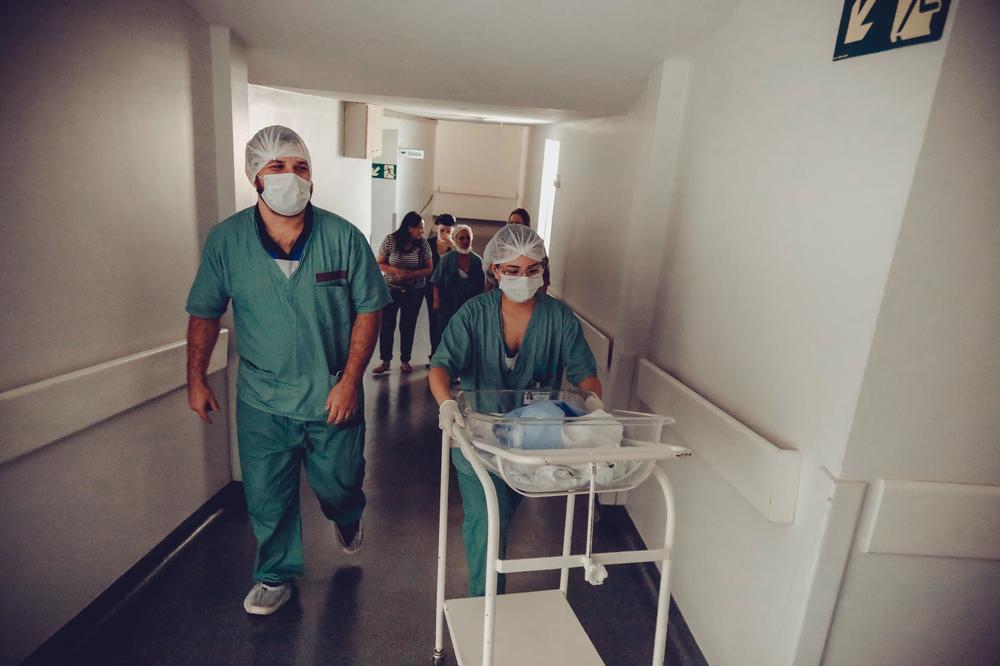
Caption
With bills on election procedures taking up much political bandwidth in this year’s session of the General Assembly, health care didn’t occupy as big a spotlight as in previous sessions.
Credit: Stephen Fowler/GPB

With bills on election procedures taking up much political bandwidth in this year’s session of the General Assembly, health care didn’t occupy as big a spotlight as in previous sessions.
A proposal allowing “legal representatives” more access to patients during health emergencies was approved by the Georgia House on Monday after emotional testimony by several lawmakers, including House Speaker David Ralston.
The chamber’s passage of House Bill 290, along with a flurry of other measures, came during Crossover Day. That’s the deadline for a bill to gain passage by at least one chamber of the Legislature or lose its chance to become law this year. (Occasionally such a dead bill is revived by attaching its provisions to another bill that has already passed a chamber.)
With bills on election procedures taking up much political bandwidth in this year’s session of the General Assembly, health care didn’t occupy as big a spotlight as in previous sessions.
But there were some notable bills passing one chamber, as well as significant budget increases for public health and mental health services.
House Bill 290, which passed by a 113-57 vote, would require hospitals and long-term care facilities to allow a “legal representative” of a patient or resident to visit the person at least one hour a day. This official-sounding term refers in most cases to a patient’s loved one, such as the next of kin. Under the bill, the facilities would set the rules and conditions of the visits.
Georgia’s long-term care ombudsmen had urged the state to ease its COVID-inspired restrictions on visits, saying facility residents were suffering from isolation and loneliness.
Rep. Ed Setzler, an Acworth Republican and the bill’s lead sponsor, spoke during deliberations about his 82-year-old father-in-law, who was hospitalized in Gwinnett County after a serious cardiac event and was not allowed a visit from his daughter. She “was turned away again and again and again,’’ Setzler said.
Rep. Bonnie Rich (R-Suwanee), who also spoke in favor of the bill, talked about her own medical experience and how important the presence of her family was.
The hospital industry opposed the legislation, citing concern about infection spread.
Rep. Debra Bazemore, a Riverdale Democrat, called the legislation “a feel-good, tug-at-your-heartstrings bill.’’ She said health care professionals, not the Legislature, should be trusted to make visitation rules. “I choose to trust the science and medical professionals,’’ Bazemore said. “There’s no need to codify this process.’’
Rep. Erick Allen (D-Smyrna), another opponent of House Bill 290, said no medical professional wants to prevent a patient from seeing a beloved family member, but that safety is a paramount concern.
Supporters of the bill noted how important family members are to a patient or resident.

Speaker Ralston (R-Blue Ridge) spoke of his personal experience with visitation restrictions. He talked of how a young husband whose wife was dying turned to him for help in seeing her. “I couldn’t do it,’’
Rep. Patty Bentley, a Butler Democrat, talked about potential restrictions on visiting her husband, who has been diagnosed with COVID-19, if he enters a long-term care facility. And Rep. Jesse Petrea, a Republican from Savannah, said that if aides and housekeepers can regular come into a patient’s room, “why can’t that one legal representative come in for one hour a day?’’
Speaker Ralston (R-Blue Ridge) spoke of his personal experience with visitation restrictions. He talked of how a young husband whose wife was dying turned to him for help in seeing her. “I couldn’t do it,’’ recalled Ralston, one of the most powerful people in the state. “He said goodbye on FaceTime.’’
A friend said goodbye to his mother through a window, Ralston added. Still another woman had trouble explaining to her mother why she couldn’t visit her, he said
The bill now goes to the state Senate. The Legislative session is expected to end March 31.

One bill would create a panel that would look into increased screening of newborns in the hospital.
Also passing the House Monday was legislation creating a committee that would make recommendations to the Department of Public Health for the addition of new disorders to Georgia’s newborn screening practices. Newborns are regularly screened for a standard panel of diseases and disorders so that they can receive any necessary services or care as soon as possible after birth.
The House also approved legislation that would remove a loophole for individuals charged with distracted driving for the first time. Georgia law currently allows those who are charged with violating the Hands-Free law for the first time to appear before the court with a device or proof of purchase of a device that would prevent them from distracted driving. State law currently requires the court to clear the individual of this first offense if there’s proof of that purchase. House Bill 247 removes that first-offense waiver.
A proposal also clearing the House would require hospitals to participate in a survey on whether their electronic health record system restricts access to patient data with other facilities’ systems. A patient who cannot get this data transferred seamlessly from one provider to another can run into a roadblock in getting medical care, said Rep. Mark Newton (R-Augusta), who’s a physician. “We should not put the burden on the patient when they’re sick.’’
And the Senate passed a stripped-down bill that clarified that the state Public Health commissioner has the authority to appoint a district health director.
The original version of Senate bill 256 would have taken authority from counties’ boards of health and given it to the Department of Public Health. It also would have loosened the required qualifications for a district health director, allowed the Public Health commissioner to redraw district maps, and overall would have concentrated more power in the commissioner’s office.
Among the health care bills already moved through one chamber was legislation creating an automatic “express lane’’ for Medicaid eligibility to children who receive food stamps.
Tens of thousands of uninsured kids could gain coverage if House Bill 163 gets final approval.
Other states, including Alabama, South Carolina and Louisiana, have already adopted the express lane – and have increased coverage of uninsured children, said the bill’s lead sponsor, Rep. Sharon Cooper (R-Marietta), who’s chairman of the House Health and Human Services Committee.
“This is especially important for people in rural areas’’ because they often lack broadband or cellphone service, or transportation to a DFCS office, said Cooper. “We are delaying children from getting health care when they are eligible to have it,’’ she told her committee.
The Senate earlier passed legislation that would put Georgia on standard time all year. It would stop the current system of switching back and forth twice a year between standard and daylight time. Health experts say these switches disrupt sleep patterns. Interfering with sleep following time changes every March and November affects Georgians’ health and causes mood swings, said Sen. Ben Watson, a Savannah Republican and physician who was the bill’s chief sponsor.
“There’s a significantly higher percentage of heart attacks during the spring-forward time,” Watson said.
The wording of Watson’s bill was tailored to comply with current federal law. Right now, that law permits individual states to enact year-round standard time but not year-round daylight saving time, the Capitol Beat News Service reported. So while Watson’s bill would put Georgia on standard time all year, it also calls for the state to move to daylight saving time if and when Congress votes to allow that. (Meanwhile, Georgia’s annual switch to daylight time is coming up this weekend.)
But the House passed legislation Friday calling for Georgia to observe daylight saving time all year. The one thing both chambers agree on is that the state should stop switching from standard time to daylight every March and back again to standard each November.
Patient brokering is a practice of a drug treatment center or similar facility paying a third party for referring a patient to their business. The practice can lead to much higher charges for the patient. Senate Bill 4, which passed that chamber unanimously, would prohibit brokering and establish penalties for it.
And the House approved a measure that would require health insurers to offer one ‘‘reasonably priced’’ comprehensive insurance policy that covers pre-existing conditions, in case Congress repeals the 2010 Affordable Care Act (ACA) or a court strikes down or significantly alters the act. The ACA prohibits insurers from their longtime former practice of charging higher premiums to people with such conditions. While the ACA has withstood various repeal attempts and court challenges, there is currently a challenge to it before the U.S. Supreme Court, and there is concern about the potential disruption that an unfavorable ruling would cause.
And earlier, the House passed “Gracie’s Law,’’ which would make the state the latest to ban discrimination against individuals with physical and mental disabilities in the organ transplant process. The measure is named after a young Georgian with Down syndrome named Gracie, whose parents took up the issue after learning she may have needed a heart transplant.
This story comes to GPB through a reporting partnership with Georgia Health News.